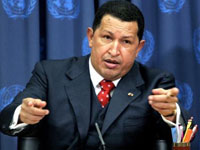Hugo Chavez insults most everyone
Hugo Chavez supposed to become his own worst enemy.

In the past few weeks alone, he has insulted Colombia's president, Venezuela's Roman Catholic hierarchy and Spain's former prime minister. The kings of Spain and Saudi Arabia have publicly rebuked him for impudence.
Even some allies are annoyed at the Venezuelan president's acid tongue, constant meddling in other nation's affairs and seeming inability to divorce the personal from the political.
But with only days to go before a Dec. 2 referendum on dozens of constitutional changes that could cement his power in Venezuela, Chavez appears more concerned about his popularity at home than whom he might anger abroad.
Besides, taking on Spanish royalty and Colombia's right-wing president can only win him votes.
Chavez has never been one to hold back his bluster, and when Colombian President Alvaro Uribe canceled his high-profile effort to mediate a prisoner swap with leftist rebels, Chavez let loose.
"Uribe is lying in an ugly and shameless manner," he frothed. And Colombia "deserves a better president, at least more dignified."
Chavez also took on Venezuela's top Catholic clerics, saying "the cardinal and the bishops are dolts, mental retards" for asking countrymen to vote their conscience in Sunday's referendum.
Riding high on US$100-a-barrel oil from the world's largest proven petroleum reserves outside the Middle East and infused with unflagging self-righteousness, Chavez appeared not to care a whit that King Abdullah of Saudi Arabia objected to his anti-U.S. proposal that OPEC "assert itself as an active political agent."
Nor was Chavez fazed that King Juan Carlos of Spain asked him to "shut up" after he repeatedly called Spain's former prime minister, Jose Maria Aznar, "a fascist" at a summit of Ibero-American leaders in Chile earlier this month.
While Chavez's economic policies may be discouraging foreign investment, windfall oil profits have so far prevented serious harm to Venezuela from his pugilistic rhetoric and grandstanding antics.
"I think he feels supremely confident because he's got this energy market that couldn't be more favorable," said Michael Shifter, an analyst with the Inter-American Dialogue think tank in Washington, D.C.
Chavez declared Sunday that he was putting ties with Colombia "in a freezer" and on Tuesday his foriegn ministry said it had recalled Venezuela's ambassador from Bogota for an "exhaustive evaluation of bilateral relations."
But the dynamics of a globalized economy should work against a deeper political fissure.
The two countries share a robust US$5 billion (€3.37 billion) in annual trade - two-thirds of it Colombian exports. Venezuela's supermarkets, heavily dependent on Colombian eggs, chicken and other agricultural products, have recently suffered shortages of such imports, in large part because of currency controls imposed by Chavez.
"All the (Colombian) economic groups are very worried. They've already met with Uribe. There's a million jobs in play on the Colombian side," said Enrique Santos, co-director of El Tiempo, this country's most influential newspaper.
Chavez has also declared he is freezing relations with Spain until its king apologizes, though he has announced no punitive actions.
Shifter is among analysts who believe Chavez is simply being his impetuous self.
Others think he's playing to the home crowd.
"Chavez isn't thinking about invading Colombia, or attacking Colombia or declaring war on Colombia," said Teodoro Petkoff, who edits the weekly newspaper Tal Cual and is among Chavez's most outspoken critics. "You can bet that after the referendum is approved things will return to normal."
Opinion surveys show Chavez faces strong opposition in Sunday's vote, which will determine whether Chavez can be re-elected indefinitely and have other new powers to reshape Venezuela in a socialist mold.
The larger question is whether Chavez's attack-dog temperament is damaging his efforts to supplant U.S. influence in Latin America. Though he has plenty of allies in the region, "there is almost no leader in Latin America with whom Chavez hasn't fought," Petkoff notes.
Chavez recently upset Chile's center-left president, Michelle Bachelet, by suggesting that her country restore Bolivia's access to the sea, territory Chile seized in an 1879 war.
"I asked him not to make any more such declarations," she said in a TV interview last week.
He's also alarmed some Latin American intellectuals, such as Mexican novelist Carlos Fuentes, who sees him as a traditional dictator posing as a leftist crusader.
"This demigod called Hugo Chavez appears with his red beret, dressed like Mussolini on a balcony, and begins to seduce people with his siren's call," Fuentes said in an interview aired Tuesday on the Televisa network.
Chavez relished his role as mediator between Colombia's rebels and rightist government - a role easily earned with his leftist credentials but lost through a lack of discretion.
He apparently couldn't help himself after meeting with French President Nicolas Sarkozy in Paris last week, voicing what many construed as an endorsement of Uribe's nemesis, the Revolutionary Armed Forces of Colombia, or FARC.
Wouldn't it be great, said Chavez, if a prisoner swap "opens the door to a peace accord that allows the FARC to form its own political party?"
Less than 48 hours later, Uribe canceled his mediation role.
Subscribe to Pravda.Ru Telegram channel, Facebook, RSS!


